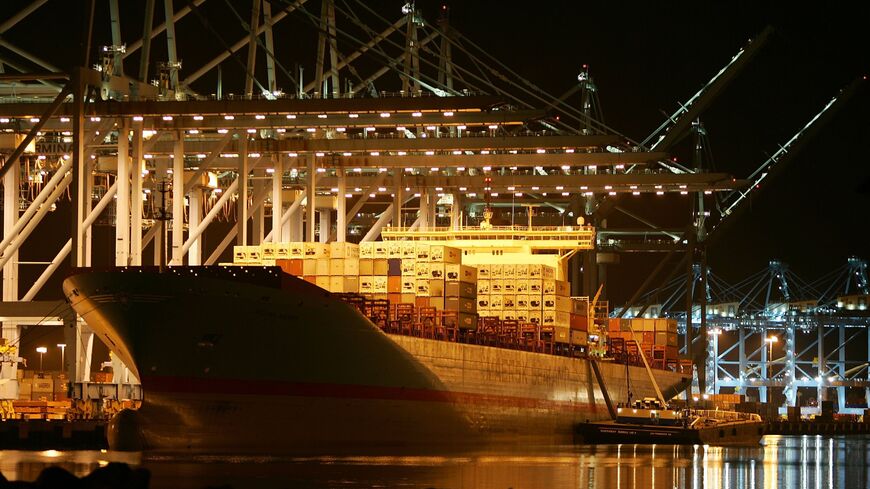CAIRO — Egypt’s President Abdel Fattah al-Sisi recently issued directives to accelerate cooperation with Danish shipping giant Maersk to produce green energy and clean fuels for ships.
The directives came during Sisi’s meeting Sept. 19 with Maersk CEO Soren Skou. The two discussed a project to produce clean fuel for ships in Egypt with investments worth $15 billion, which will provide more than 100,000 job opportunities for Egyptians.
A statement published by the Egyptian presidency following the meeting said that “cooperation with Maersk to produce green and clean fuel for ships comes in line with the state's efforts to diversify energy sources and shift to a clean energy and preserve environment. It also comes in light of the modern ports Egypt has now established along the coasts of the Red Sea and Mediterranean Sea, as well as the Suez Canal waterway, the main lifeline of international trade.”
The meeting comes as Egypt gears up to host the Conference of Parties to the United Nations Climate Convention (COP27), which will be held in Sharm el-Sheikh in November.
Lt. Gen. Osama Rabie, chairman of the Suez Canal Authority (SCA) who attended the meeting, said in a phone interview with the local channel TEN on the same day (Sept. 19), “President Sisi affirmed his full support for the project to produce clean fuel for ships with Maersk Group and his help to complete all necessary matters for the implementation of this project in the coming period.”
The project’s execution schedule has yet to be announced.
Rabie further pointed out that Sisi asked Maersk during the meeting to expand the implementation of the project beyond the Ain Sokhna port and establish more than one plant for clean energy at ports such as in Gargoub, Alexandria and Berenice. The company promised to consider this, he added.
Rabie also praised the great cooperation between the SCA and Maersk, which will be strengthened during the coming period through training of SCA guides and administrative cadres.
According to the Sept. 19 presidency statement, Skou applauded the SCA “for undergoing development, keeping pace with the latest modern technologies, as well as modernizing the Suez Canal and its infrastructure.”
He added, “This, in turn, would make Egypt qualified to become the main and pivotal hub for supplying and refueling ships with green fuel in the region.”
In this vein, Paul Sullivan, a nonresident senior fellow with the Atlantic Council's Global Energy Center, told Al-Monitor, “Having cleaner energy options for shipping is very important. CO2 emissions from shipping are estimated to be around 3% of the total global emissions. Anyone observing these ships in motion can often see darker smoke as they warm up the engines for the long voyages ahead.”
Sullivan added, “Any efforts that would successfully reduce emissions and pollution from giant ships are welcome. The distribution of clean fuel to ships in Egyptian ports is a great milestone for Egypt.”
He noted that finalizing the agreement on the project with Maersk before COP27 is very important for Egypt. “Through this project, Egypt can secure great opportunities for training, education and employment for Egyptians,” he said.
Sullivan further praised the project as a good option for Egypt, given the importance of the Suez Canal in the region. “The fuel provided through this project will be the cleanest energy available to ships and will constitute a good step forward.”
Wael Kaddour, former SCA vice chairman, told Al-Monitor that the International Maritime Organization (IMO) of the United Nations began implementing its resolution to cut emissions from ships at the beginning of 2020, and thus ships are forced to use fuel with less emissions.
In 2018, the IMO set a goal of reducing carbon emissions from ships to 50% by 2050.
Kaddour said, “The whole world is keeping a watchful eye on climate change and its negative effects on peoples. Some ships began to use fuels that contain less sulfur, such as methanol, in order to reduce environmental pollution. Others are trying to use the so-called clean and green fuels but are hindered by its high cost exceeding $200 per ton compared to conventional fuels such as diesel and gasoline.”
He indicated that cooperation between the Egyptian government and Maersk is part of Egypt's efforts to preserve the environment and falls within the framework of its organization of the upcoming climate summit.
“Egypt has capabilities to use liquefied gas as fuel for ships since it has good gas reserves and liquefaction stations, and all it needs are units to transport fuel from the liquefaction stations to the ports and to establish stations in the ports that supply ships with this type of fuel,” Kaddour said.
He believes that “Egypt will achieve many gains from its cooperation with Maersk for the production of clean fuel. The latter will be providing refueling services for all transiting ships, which creates an additional advantage for the Suez Canal, turning it into a source for supplying ships in the region with liquefied gas or hydrogen. This project will also create a lot of job opportunities for Egyptians.”







